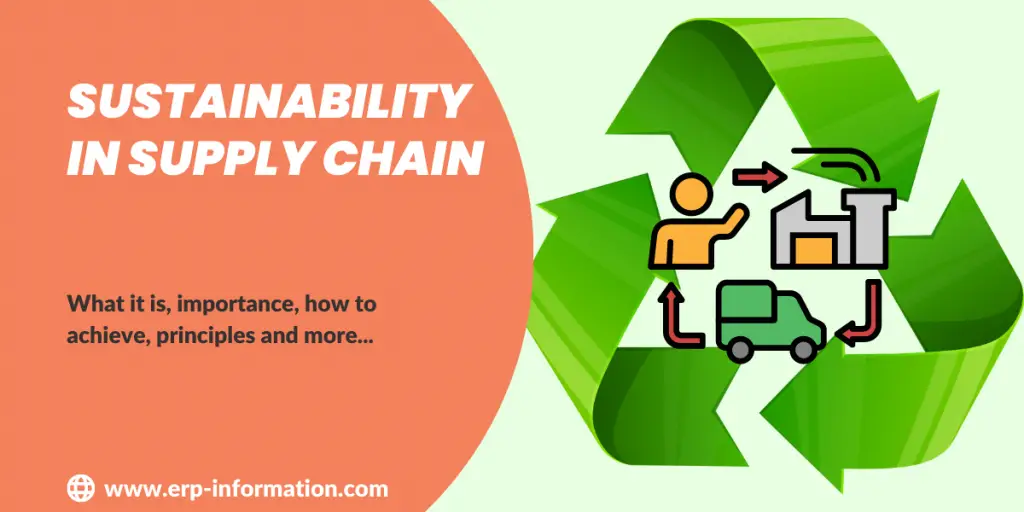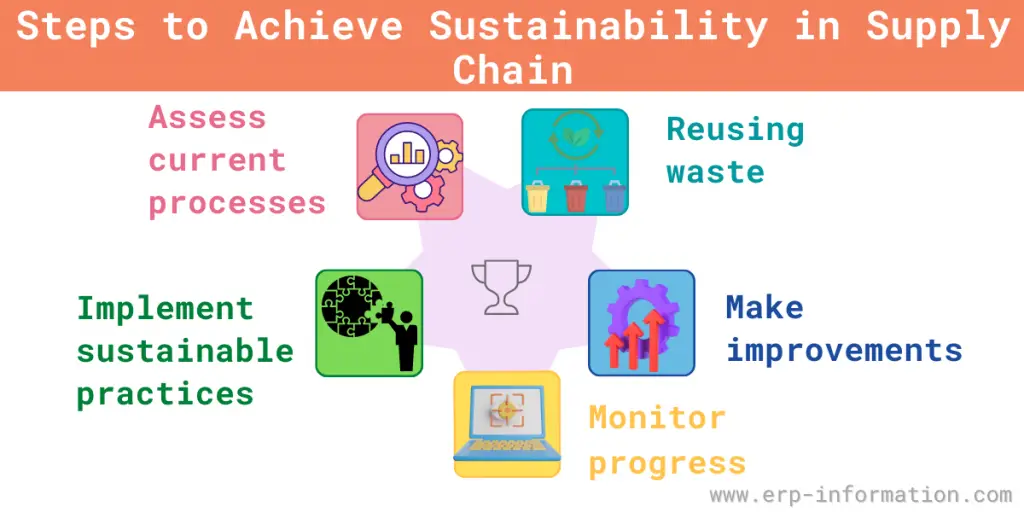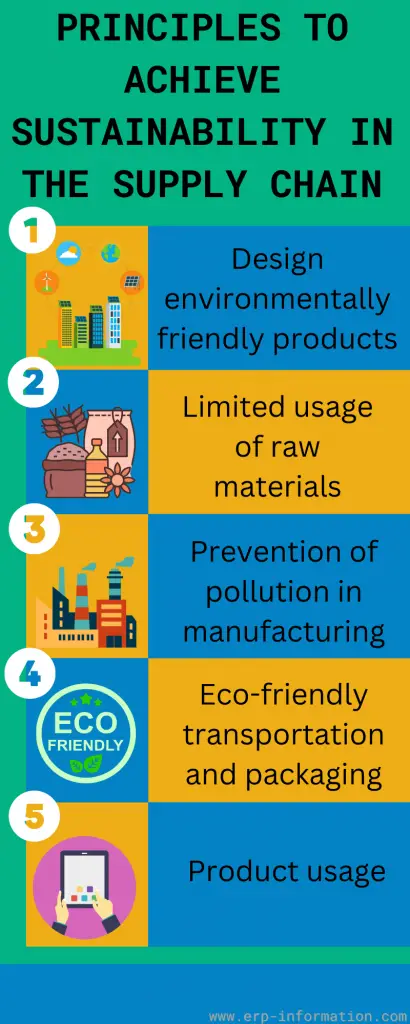Sustainability in the supply chain is an important factor contributing to a company’s success. Sustainability in the supply chain is a management process that helps organizations identify, assess, and improve their environmental and social impacts.
This post will provide an overview of what sustainability means in the context of supply chains, how it can achieve, and the benefits it brings to businesses.
What is sustainability in supply chain?
Sustainability in supply chain refers to the efforts made by organizations to identify, assess, and improve their environmental, financial, and social impacts—the business use environmentally and socially sustainable practices throughout the whole process.
Environmental impacts mean pollution, greenhouse gas emissions, deforestation, and control of water usage.
Social impacts mean health and safety, working conditions, corruption, fair labor practices, human rights, etc.
Environmental sustainability in supply chain
Environmental sustainability in the life cycle is an approach that endeavors to reduce the environmental impact of goods and services throughout their life cycle, including production, use, and disposal.
- It involves practices such as improving the efficiency of processes, reducing waste, recycling materials and products, and utilizing renewable energy sources.
- Through these measures, businesses can ensure they are not causing irreparable environmental damage while still providing necessary goods and services to their customers.
Financial sustainability in supply chain
It balances long-term economic considerations with short-term economic responsibilities to ensure financial stability and smooth operations.
It involves
- Managing costs, ensuring adequate resources and financing, mitigating risks,
- We are developing strategies that are both efficient and effective.
- Financial sustainability also encompasses processes for accountability and monitoring performance to ensure that resources are allocated effectively and efficiently across the entire supply chain network.
Social sustainability of supply chain
It focuses on the social impact of decisions and activities within the scope of the supply chain.
It includes topics such as
- Human rights, labor standards, social welfare, environmental protection, and other sustainability-related issues.
- This focus aims to ensure that suppliers and customers adhere to ethical standards and local regulations to minimize potential negative impacts on people and communities.
- Additionally, it is important to consider the potential for positive outcomes such as job creation and community development.
Importance of sustainability in supply chain
The importance of sustainability in the supply chain is as follows.
Improves the environmental quality
It involves looking at a product’s life cycle from production to consumption while considering energy efficiency, waste, and pollution factors.
Control of Pollution, proper usage of water, control of the use of natural resources, and clean and non-toxic air are the major things that can achieve by supply chain sustainability.
Cost saving
This helps to create a more efficient and less wasteful supply chain which has an all-inclusive positive impact on the environment and cost savings for companies. In addition, sustainable practices result in tremendous cost savings.
Investing in green initiatives such as eco-friendly vehicles and water runoff management helps preserve natural resources and positively impacts the company’s bottom lines.
Evaluate Vehicle emission calculator using our Vehicle emission calculator online
Improves the reputation
Sustainability in supply chain management is becoming increasingly important as it enables companies to reduce their ecological footprint and improve their reputation.
Increases competitiveness
Sustainability practices can attract new customers and remain competitive in an ever-changing market. It helps companies to remain competitive in an ever-changing market.
Mitigating risk
Sustainability can help companies mitigate risk by ensuring they have access to critical resources during a supply chain disturbance. In addition, it helps to prepare the business for all potential threats.
How can you achieve sustainability in your supply chain?
There are several steps organizations can take to ensure their supply chains are sustainable:
Assess current processes
The first step is to assess the supply chain’s current state and identify potential improvement areas. For example, minimizing the inventory and collaborating with sustainable suppliers.
Implement sustainable practices
Companies can implement various sustainable practices, such as utilizing renewable energy sources, reducing waste production, and optimizing transportation distances.
Monitor progress
It’s important to monitor the sustainability initiatives’ progress and ensure they achieve the desired results.
Make improvements
It’s also important to look for opportunities to make further improvements and ensure the sustainability of the supply chain is constantly improving.
Reusing waste
Organizations can think about using waste products to produce some other products or the same.
Principles to achieve sustainability in the supply chain
Companies can follow the below principles to achieve sustainability in the supply chain.
Design environmentally friendly products
The first step in making longer-lasting products is to design them better. This will help the environment and also save money in the long run. The greatest way to do this is to ensure the product is made with sustainable materials built to last.
Limited usage of raw materials
All the stuff we need comes from the Earth. However, these things affect the environment differently, like using up resources or hurting animals’ homes. So instead of using new things, we can use recycled materials and bi-product waste.
Prevention of pollution in manufacturing
Manufacturing products can pollute the environment. This happens when factories make waste harmful to the air, water, and land. To avoid this, control air, water, and soil pollution, reserve resources, reduce water usage, recycle raw materials, etc.
Eco-friendly transportation and packaging
After manufacturing, next comes packing of the product and distribution. Again, simplifying packaging and using eco-friendly materials for packing can avoid pollution.
Distribution is a big task that needs a transportation facility. Distribute the products locally as much as possible or use low-impact delivery vehicles.
Product usage
The product should be long-lasting with minimal maintenance. It should consume less electricity, water, or chemicals.
Not to encourage throw-away and short-span products that end up in landfills or oceans. Recycling means using materials from your old products to make new products.
Case studies
Several organizations have successfully implemented sustainable practices into their supply chains, such as
Walmart
Walmart has been working to reduce its environmental impact by focusing on sustainable sourcing, energy efficiency, and waste reduction.
Apple
Apple has implemented various sustainability initiatives across its supply chain, from renewable energy sources to reducing water consumption.
Unilever
Unilever is one of the leading companies in sustainability and has implemented several initiatives to reduce waste, promote renewable energy sources, and improve labor conditions.
FAQs
What role does technology play in sustainable supply chain management?
Technology aids in tracking and optimizing resource use, improving transparency, reducing waste, and enabling data-driven decisions.
How can companies integrate sustainability into their supply chain practices?
Companies can adopt sustainable sourcing, implement eco-friendly packaging, optimize logistics for efficiency, and collaborate with ethical suppliers.
Conclusion
This blog has explained the importance of sustainability in supply chain management, what it is and how companies can achieve it. By implementing sustainable practices, companies can make their supply chains more efficient, reduce their environmental impact and become more competitive in an ever-changing market.
Organizations must take the necessary steps to ensure the sustainability of their supply chains if they want to remain successful in the future.


